 Call for Papers, Performances, Machines and Sponsors. Scottish SF author Iain Banks created a fictitious group-civilisation called "Culture" in his eponymous narrative. The vast majority of humanoid people in the "Culture" are born with greatly altered glands housed within their central nervous systems, who secrete - on command - mood- and sensory-appreciation-altering compounds into the person's bloodstream. Additionally many inhabitants have subtly altered reproductive organs - and control over the associated nerves - to enhance sexual pleasure. Ovulation is at will in the female, and a fetus up to a certain stage may be re-absorbed, aborted, or held at a static point in its development; again, as willed. Also, a viral change from one sex into the other, is possible. And there is a convention that each person should give birth to one child in their lives. It may sound strange, but Banks states that a society in which it is so easy to change sex will rapidly find out if it is treating one gender better than the other. Pressure for change within society would presumably build up until some form of sexual equality and hence numerical parity will be established.Please send us your papers, ideas, machines! Deadline: July 31, 2009! Festival Schedule:Arse Elektronika 2009 will take place in San Francisco, USA. Link Bob Ross, the People's Painter - Happy Trees Darwin vs. Freud: The Evolutionary Enigma of Dream Content In a recent review of evolutionary theories concerning the possible adaptive function of dreaming, Barrett shrugs off the better-known psychoanalytic theories of dreams (for example, Freud's "wish fulfillment" and Jungian archetypes) as being irreconcilable with a Darwinian framework and instead highlights the major contemporary, biologically informed theories. Remember, the key question for us to consider is why dreaming occurs at all, since it's not immediately apparent why natural selection wouldn't have simply engineered a dreamless, non-REM sleep.Link Domestic Wars Redux: Obama, Digital Prohibition and the New 'Reefer Madness' January 2009: In a reflexive public gesture, the U.S.'s first African-American President-elect, the ectomorphic Barack Obama, retraced Abraham Lincoln's Second Inaugural train route (1865) to the capitol, two hundred years after the birth of the similarly ectomorphic Lincoln. In another reflexive echo of a turbulent past, as the bloated and behemoth U.S. economy wobbled, cold-turkey, in withdrawal from its macro-economic drugs of choice, easy credit and unbridled consumption, Obama faced a dire economic and social configuration similar to that which confronted Franklin Roosevelt in March of 1933. Hemorrhaging jobs, personal and institutional debt while spewing endemic mortgages defaults, the U.S. faced its most severe legitimacy crisis since the late 1960s.Link Paul Mason's "Meltdown": developing a coherent alternative to neoliberalism Larry Elliott welcomes Paul Mason's new book Meltdown, because it takes forward the urgent task facing the left of developing a coherent alternative to neoliberalism. But Elliott urges us also to seek solutions to the climate and energy crisis simultaneously with the financial crisis.
It's the end of an era. Things will never be the same again. The age of neoliberalism is dead. How many times have we heard those pat phrases these past 18 months or so as what started as a little local difficulty in the US housing market developed into the biggest financial crisis since the Great Depression. There are certainly good reasons for the left to believe that the tide has at last turned after three decades in which the right has been in the ascendancy. As Paul Mason illustrates in this excellent account of the humbling of the former masters of the universe, the crash was the consequence of 'giant hubris and the untrammelled power of a financial elite'.Link 'Neurologger' Reads Bird Brains In Flight Using a "neurologger" specially designed to record the brain activity of pigeons in flight, researchers reporting online on June 25th in Current Biology, a Cell Press publication, have gained new insight into what goes through the birds' minds as they fly over familiar terrain.
Link monochrom: new event calendar/RSS feature   Link / Site Link / English RSS (By the way, RIP Michael "Foucault" Jackson.) PostSecret: mail art project about secrets PostSecret is an ongoing community mail art project, created by Frank Warren, in which people mail their secrets anonymously on one side of a homemade postcard. Select secrets are then posted on the PostSecret website, or used for PostSecret's books or museum exhibits.
 Link Dorkbot Vienna #9: Martin Kaltenbrunner (reacTIVision, TUIO, reactable)  Martin Kaltenbrunner is a Human Computer Interaction Designer, currently finalizing his Ph.D. at the Pompeu Fabra University in Barcelona, Spain. Recently he has been mainly working on the interaction design of the reacTable - a tangible modular synthesizer based on a multi-touch surface. He is author of the open source tangible interaction framework reacTIVision and the related TUIO protocol, which has been widely adopted for open source multi-touch applications. He is co-founder of reactable systems SL, dedicated to the development of novel HCI concepts and products, while he is teaching classes and workshops on tangible interaction at the Kunstuniversität Linz and at the UCP Porto.Sunday, June 28, 2009. 7 PM @ Metalab Vienna (Rathausstrasse 6, 1010 Vienna) Link 'Worm porn' video shows details of nematode sex Some might call it worm porn, but a video showing a male worm preparing to mate with a hermaphrodite could equally be described as balletic in its graceful movement.
Link US patent 5255452: Michael Jackon's anti-gravity lean US patent 5255452, filed by Michael Jackson, described the anti-gravity lean used in the music video for "Smooth Criminal".
 Link Stoned wallabies make crop circles Australian wallabies are eating opium poppies and creating crop circles as they hop around "as high as a kite", a government official has said.
Link (via Mae Saslaw) Free Speech vs. Surveillance in the Digital Age Tools of mass communication that were once the province of governments and corporations now fit in your pocket. Cell phones can capture video and send it wirelessly to the Internet. People can send eyewitness accounts, photos and videos, with a few keystrokes, to thousands or even millions via social networking sites. As these technologies have developed, so too has the ability to monitor, filter, censor and block them.Link Complexity and Causality in Nutritional Research The complex and difficult problem of causality is central to our understanding of nutrition research. A cause is defined as "that factor which is possible or convenient for us to alter in order to produce or prevent an effect. This concept contains two components: production of an effect and an understanding of its mechanisms." To understand current concepts of causality, it is helpful to briefly review historical thinking about it. Aristotle believed that bodies in motion required constant force (efficient cause) to keep them moving, that the seed contained the adult (teleological cause). After more than 2,000 years, Newton overturned Aristotle in physics with the concept of inertia. Hume further advanced our understanding by postulating that our notion of causality depends on well-documented associations. Partially correct, Kant believed the mind (brain) imposes notions of time, extension, and causality on nature.Link Immortality, Glory And Happiness This is what the Greeks called 'glory,' and it expresses a very different understanding of immortality than is common amongst us. One lives on only through the stories, accounts and anecdotes that are told about one. It is in this that happiness consists. This has a very peculiar consequence for societies like the United States, so singlemindedly devoted to the pursuit of happiness. We assume that the question of happiness is a question of my happiness or, more properly, of my relation to my happiness. But why?Link monochrom's "Department For Criticism Against Globalisation" @ Common History/MUSA/Vienna   The exhibition "Common History and Its Private Stories. Geschichte und Geschichten" is an attempt to honour the twentieth anniversary of the fall of the Berlin Wall not so much as the main event of recent European history but as an event with massive implications; an event, which triggered a succession of political and global events that are defining our lives in the last 20 years. [...] Due to the strong increase in dialogue and cooperation in the world of politics, business, art and culture, it has become necessary to readjust and fine-tune our attitude towards everything that is different. National and international aspects have been increasingly intermingled, public entities have been privatised – all these aspects have shaped the recent common history in Europe and beyond.Link Peter Custers: green means zero growth With the world economy in disarray and military expenditure spiralling, what hopes are there of a genuinely Green New Deal? In this month's podcast, George Miller talks to Peter Custers, an expert on the international arms trade, about his article "Towards zero growth", which argues that "an economy that refuses to grow" is exactly what the world economy must aim for. He sees positive signs in Germany's policy on renewable energy and offers his verdict on how green Barack Obama will turn out to be.
Link (podcast) Too complex to exist: power grids, financial market? On Aug. 10, 1996, a single power line in western Oregon brushed a tree and shorted out, triggering a massive cascade of power outages that spread across the western United States. Frantic engineers watched helplessly as the crisis unfolded, leaving nearly 10 million people without electricity. Even after power was restored, they were unable to explain adequately why it had happened, or how they could prevent a similar cascade from happening again - which it did, in the Northeast on Aug. 14, 2003.Link The Wold is an Apple (minus Madagascar) Throw-n-fetch bot Researchers probe the genetic basis of memory A group of Montreal researchers has discovered that GCN2, a protein in cells that inhibits the conversion of new information into long-term memory, may be a master regulator of the switch from short-term to long-term memory. Their paper Translational control of hippocampal synaptic plasticity and memory by the eIF2a kinase GCN2, which was published in the journal Nature, provides the first genetic evidence that protein synthesis is critical for the regulation of memory formation.
Link Bubblenomics: Economic cataclysms now and then Economic cataclysms such as the Great Depression or today's ongoing collapse of global finance destroy commonly held understandings of political and economic reality. That is one reason why we call them cataclysms; such events occur precisely because no one with the power to do anything about them saw them coming. Icebergs spotted in time do not, after all, sink ships. But once the conventional wisdom has joined prosperity and confidence in the wreckage on the ocean floor of the global economy, we begin to hear of 'the' explanations for what happened. Such proclamations mark the times as surely as collapsed Ponzi schemes, falling governments, ruined banks and suicides among the former nouveaux riches. Thus, in the aftermath of the Depression, there emanated from various quarters announcements that the reasons for the catastrophe lay in policy errors by the Federal Reserve, in the Smoot–Hawley Tariff Acts, in stock trading on the margin, in vengeful treatment of Germany in the Versailles Treaty and so forth.Link monochrom: updated t-shirt site online  And we have a new shirt in German language -- "man spricht antideutsch"... just in case you are interested in the "exotic".  Link / Order Construction Begins on Spaceport America After years of planning, ground is officially being broken in New Mexico for the world's first interstellar airport.  Link UK Cabinet Secretaries' Notebooks from World War Two The UK Government National Archives have released the Cabinet Secretaries' Notebooks from World War Two. These notes give a few brief snippets about the views of Churchill and his war cabinet to events of WWII.
There is, for example, a transcript of a meeting on the 15th June 1942, discussing reprisals for German Massacre of a Czechoslovakian Village. Churchill favored the summary execution of Nazi leaders by Electric Chair at this meeting. Another meeting was a discussion of how to come to terms with the American policy of segregation to its 'coloured' troops. Link Geonames / The countries of the world in their own languages and scripts I can't stop spending hours and hours on this site...
"The countries of the world in their own languages and scripts; with official names, capitals, flags, coats of arms, administrative divisions, national anthems, and translations of the countries and capitals into many languages") to get to the meat of the site, a collection of links to various pages: Days, Months, Planets, Mountains, etc.; a huge list of languages with each name given in the original (with transliteration where appropriate); various other random items (including a small set of famous people: it's fun to see the varying forms of Charlemagne); an Alphabets section; and finally a set of Glossaries, with a few hundred English words translated into, well, everything (divided into manageable sets: Albanian|Greek|Armenian, American|Polynesian, Asian, Balto-Slavic, Basque|Caucasus, Celtic, Constructed, etc.).Link (via Languagehat) Israeli scientists show bacteria can plan ahead Bacteria can anticipate a future event and prepare for it, according to new research at the Weizmann Institute of Science. In a paper that appeared in Nature, Prof. Yitzhak Pilpel, doctoral student Amir Mitchell and research associate Dr. Orna Dahan of the Institute's Molecular Genetics Department, together with Prof. Martin Kupiec and Gal Romano of Tel Aviv University, examined microorganisms living in environments that change in predictable ways. Their findings show that these microorganisms' genetic networks are hard-wired to 'foresee' what comes next in the sequence of events and begin responding to the new state of affairs before its onset.Link Argentina's Community Media Fights for Access and Legal Reform In response to misinformation and lack of access in the mass media, citizens have created alternative media networks that play a fundamental role in today's Latin America. Together, these community television stations are transforming the media landscape throughout the Americas. This redefined space for independent media has three vital functions: disseminating alternative information; providing a space for popular voice and especially the voice of groups underrepresented in the media; and building community. In Argentina, citizen media groups simultaneously fight for autonomous spaces and for reforms in media laws that will allow them to operate legally.Link British Library Puts 19th-Century Newspapers Online Bad news is never new, but anyone overwhelmed by today's political scandals, wars, financial disasters, soaring unemployment and drunken feral children can take refuge in the 19th century - and its wars, financial disasters, political scandals, soaring unemployment and drunken feral children. Over two million pages of 19th and early 20th century newspapers go online today, part of the vast British Library collection.Link Drill! Drill! The return of trepanation In the early 1960s, a young Russian neurophysiologist called Yuri Moskalenko travelled from the Soviet Union to the UK on a Royal Society exchange programme. During his stay, he co-authored a paper published in Nature. "Variation in blood volume and oxygen availability in the human brain" may not sound subversive, but it was the start of a radical idea.Link CIA Secrecy on Drone Attacks Data Hides Abuses The U.S. Central Intelligence Agency's refusal to share with other agencies even the most basic data on the bombing attacks by remote-controlled unmanned predator drones in Pakistan's northwestern tribal region, combined with recent revelations that CIA operatives have been paying Pakistanis to identify the targets, suggests that managers of the drone attacks programmes have been using the total secrecy surrounding the programme to hide abuses and high civilian casualties.
Link Common Fish Species: 'Human' Ability To Learn? Although worlds apart, the way fish learn could be closer to humans' way of thinking than previously believed, suggests a new research study.
Link Cyberscares About Cyberwars Equal Cybermoney: Watching the Cybermilitary-Industrial Complex Form Frida Berrigan writes:
As though we don't have enough to be afraid of already, what with armed lunatics mowing down military recruiters and doctors, the H1N1 flu virus, the collapse of bee populations, rising sea levels, failed and flailing states, North Korea being North Korea, al-Qaeda wannabes in New York State with terrorist aspirations, and who knows what else -- now cyberjihadis are evidently poised to steal our online identities, hack into our banks, take over our Flickr and Facebook accounts, and create havoc on the World Wide Web.Link Brazil: more dependent than ever President Lula fancied his country's economy was 'decoupled' from the rest of the world's. But when the economic crisis reached Brazil this March, it came on a tidal wave. Half a million people are now in poverty or extreme poverty.
Link Finger popping time: Africa Bitterness: The Next Mental Disorder? No one could accuse the American Psychiatric Association of missing a strain of sourness in the country, or of failing to capitalize on its diagnostic potential. Having floated "Apathy Disorder" as a trial balloon, to see if it might garner enough support for inclusion in the next edition of the Diagnostic and Statistical Manual of Mental Disorders, the world's diagnostic bible of mental illnesses, the organization has generated untold amounts of publicity and incredulity this week by debating at its convention whether bitterness should become a bona fide mental disorder.Link Twitter client for the Commodore 64 Antonio Negri: "Keynes's communism of capital" Keynes believed in the virtues of finance; he even had an equivocal relationship with the Stock Exchange until he got kicked in the teeth – as often happens even to the most adept. (I disagree here with his biographer Harrod, who claimed that Keynes had financial speculation in his heart.) From Keynes's realistic point of view, the virtue of finance was that it was the beating heart of capitalism. Keynes subverted the old moralist conceptions that, from the Middle Ages to Hilferding, had downplayed and disqualified the hegemony of money in the production of wealth and the reproduction of social order. Against them, Keynes claimed that financial markets functioned as wealth multipliers. Can this theoretical assumption still be valid in a period of economic crisis? 'Of course it can', he asserted from his position in the middle of the crisis that started in the 1920s and assumed gigantic proportions by the end of the same decade. The state will have to intervene in society and reorganize it productively: 'Thus it is to our best advantage to reduce the rate of interest to that point relatively to the schedule of the marginal efficiency of capital at which there is full employment.'Link Watchmen: Semiotic Superheroes Since their beginning, superhero flicks have always scavenged special effects magic and visual style from the tables of preceding adventure films rather than their original source material, comic books themselves. Superman could only fly through Metropolis after Skywalker flew through the Death Star Trench; Batman only became a believable crime-fighter in the vein of Jason Bourne’s hyper-realism; and I groaned aloud in the theater when my own best-loved comic hero, Spider-Man, performed a horribly superfluous Matrix-esque slow motion flip-dodge to evade a hail of razor-sharp projectiles. Superheroes are homeless on the silver screen. The characters that inspired action films on a large scale too often prefer to dress themselves in the precedents other films rather than establishing their own stylistic identities. Good comics do more than depict fantastical stories about characters endowed with great power. They create an environment in which art and symbol converge to create semiotic storytelling that has the potential to transcend the written word. Is it possible then to develop a true "comic book film" genre, and would it have anything to contribute to the medium as a whole? 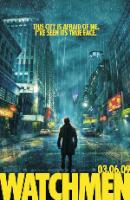 Link Plug and Play: Researchers Expand Clinical Study of Neural Interface Brain Implant BrainGate technology is designed to read brain signals associated with controlling movement, which a computer could translate into instructions for moving a computer cursor or controlling a variety of assistive devices.
Link Clive Thompson on the Future of Reading in a Digital World Books are the last bastion of the old business model—the only major medium that still hasn't embraced the digital age. Publishers and author advocates have generally refused to put books online for fear the content will be Napsterized. And you can understand their terror, because the publishing industry is in big financial trouble, rife with layoffs and restructurings. Literary pundits are fretting: Can books survive in this Facebooked, ADD, multichannel universe?Link Che Guevara: The Economics of Revolution Helen Yaffe explores impact of Che Guevara as an economist and politician.
In my first A-level economics class, at the age of 16, I was taught these guiding principles; people only produce if they can make a profit, humans have infinite desires, while resources are limited, so everything must be rationed through the price mechanism – demand and supply.Link On Game Art, Circuit Bending and Speedrunning as Counter-Practice: 'Hard' and 'Soft' Nonexistence By Seb Franklin.
In The Exploit Alexander R. Galloway and Eugene Thacker speculate that "[f]uture avant-garde practices will be those of nonexistence." This extraordinary claim is a response to the current ubiquity of digital technology and its impact on cultural politics; if existence becomes a question of being classified informatically, the avoidance of this classification, or nonexistence, becomes of paramount importance. The discussion of nonexistence in The Exploit opens with a question, one that forms the basis of this essay: "how does one develop techniques and technologies to make oneself unaccountable for?" Directly following this question comes a specific, material example through which a crucial distinction between "unaccountable for" and "invisible" or "absent" is made -- the use of a laser pointer, aimed into a surveillance camera in order to 'blind' it. In this situation, the camera is not destroyed nor is the individual shining the laser actually hiding, or invisible; instead, they are simply not present on the particular screen or data set recorded by the camera in question. The same is true of the tricking of a server, causing it to record a routine event when one goes online. These kinds of tactics, "tactics of abandonment", are "positive technologies" for Galloway and Thacker. They are entirely distinct from absence, lack, invisibility and nonbeing because they are "full" or rather, because they "permeate." The practical consequences of Galloway and Thacker's formulation of nonexistence are clear: It's not a question of hiding, or living off the grid, but of living on the grid, in potentially full informatic view, but in a way that makes one's technical specification or classification impossible.Link Rat Brain Robot This robot is controlled by the brain of a rat - making it the world's first cyborg rodent:
Link Also, Cyborg rat things have their place in Snowcrash, as we are reminded in Cyberspace, Hypertext, and Critical Theory: Haraway claims cyborgs allow us to escape domination by machines, since we have become the machines ourselves. Does this really hold true in the case of the rat-thing? The rat-thing is a slave to his machinery. It is a security device in the Snowcrash world, a mechanical dog which guards one's territory. The rat-thing is constructed from an actual live dog, and is mechanically advanced to the point where nobody really knows there is actually a dog inside the shell. This dog must stay in his (or her) temperature controlled hut to prevent from overheating, and is fed a simulacra world of never-ending Frisbee catching and steaks growing on trees to keep him occupied when he is not needed. The rat-thing waits for intruders, listening to the long range broadcasts of other rat-things, and monitering his millimeter-wave radio scanners to be sure no weapons are around.Link Godzilla Bukkake: Macroherpetophile image macros Tetris Theme on Church Organ during Service Slavoj Zizek: How To Begin From The Beginning In his wonderful short text ‘Notes of a Publicist’—written in February 1922 when the Bolsheviks, after winning the Civil War against all odds, had to retreat into the New Economic Policy of allowing a much wider scope to the market economy and private property—Lenin uses the analogy of a climber who must backtrack from his first attempt to reach a new mountain peak to describe what retreat means in a revolutionary process, and how it can be done without opportunistically betraying the cause. [...]Link Traveling-Wave Reactor: Cheaper and safer nuclear power? Unlike today's reactors, a traveling-wave reactor requires very little enriched uranium, reducing the risk of weapons proliferation. The reactor uses depleted-uranium fuel packed inside hundreds of hexagonal pillars (shown in black and green). In a "wave" that moves through the core at only a centimeter per year, this fuel is transformed (or bred) into plutonium, which then undergoes fission. The reaction requires a small amount of enriched uranium (not shown) to get started and could run for decades without refueling. The reactor uses liquid sodium as a coolant; core temperatures are extremely hot--about 550 ºC, versus the 330 ºC typical of conventional reactors.Link (via Franky) tvwww feature about monochrom (Serbian language) The Penal State in an Age of Crisis By Hannah Holleman, Robert W. McChesney, John Bellamy Foster, and R. Jamil Jonna.
As a rule, crime and social protest rise in periods of economic crisis in capitalist society. During times of economic and social instability, the well-to-do become increasingly fearful of the general population, more disposed to adopt harsh measures to safeguard their positions at the apex of the social pyramid. The slowdown in the economic growth rate of U.S. capitalism beginning in the late 1960s and early 1970s—converging with the emergence of radical social protest around the same period—was accompanied by a rapid rise in public safety spending as a share of civilian government expenditures. So significant was this shift that we can speak of a crowding out of welfare state spending (health, education, social services) by penal state spending (law enforcement, courts, and prisons) in the United States during the last third of a century...Link 10 scientific objects that changed the world To mark its centenary, the Science Museum in London had its curators select the ten objects in its collection that made the biggest mark on history. Explore them in this gallery, and cast your vote in the public poll to decide the most significant of all.
For example: the Apollo 10 capsule.  Link Freeman Dyson Takes On The Climate Establishment Princeton physicist Freeman Dyson has been roundly criticized for insisting global warming is not an urgent problem, with many climate scientists dismissing him as woefully ill-informed. In an interview with Yale Environment 360, Dyson explains his iconoclastic views and why he believes they have stirred such controversy.
Link "European Culture & Journalism 2009" about monochrom  Hidden in Quartier21's main entrance - Electric Avenue - the Monochrom office could almost be mistaken for a rebellious teenager's unkempt bedroom. Magazine cut-outs, a cartoon of a pirate's head, two ping-pong paddles, a fake parrot and a poster that reads "BUSH CHENEY" are scattered all over a large green wall. But behind every image is a story – and a strong political message. The Monochrom office in Quartier21.Link The industrial model of student mass production By Don Tapscott.
In the industrial model of student mass production, the teacher is the broadcaster. A broadcast is by definition the transmission of information from transmitter to receiver in a one-way, linear fashion. The teacher is the transmitter and student is a receptor in the learning process. The formula goes like this: "I'm a professor and I have knowledge. You're a student, you're an empty vessel and you don't. Get ready, here it comes. Your goal is to take this data into your short-term memory and through practice and repetition build deeper cognitive structures so you can recall it to me when I test you."... The definition of a lecture has become the process in which the notes of the teacher go to the notes of the student without going through the brains of either.Link What Geithner, Bernanke and All the Smart Bankers Forget: Long-Term Economic Memory Loss Paul Craig Roberts (Assistant Secretary of the Treasury in the Reagan administration) writes:
If a person lives long enough, he can watch everyone forget everything they learned. Everyone includes Federal Reserve Chairmen, economists, Bank of America "strategists," and even Bloomberg.com.Link Confronting the CIA's Mind Maze: America's Political Paralysis Over Torture Alfred W. McCoy writes:
If, like me, you've been following America's torture policies not just for the last few years, but for decades, you can't help but experience that eerie feeling of déjà vu these days. With the departure of George W. Bush and Dick Cheney from Washington and the arrival of Barack Obama, it may just be back to the future when it comes to torture policy, a turn away from a dark, do-it-yourself ethos and a return to the outsourcing of torture that went on, with the support of both Democrats and Republicans, in the Cold War years.Link New Doubts About Dinosaur-bird Links Researchers at Oregon State University have made a fundamental new discovery about how birds breathe and have a lung capacity that allows for flight – and the finding means it's unlikely that birds descended from any known theropod dinosaurs.
Link New Honzo submission: the world commiserates!  But you don't know Honzo? Well... In 1952, Austrian big-game hunter and Africa ‘researcher’ Ernst Zwilling (a colonial revisionist and member of the Nazi party) brought a male chimpanzee from Cameroon to Schönbrunn, the Viennese zoo. In his African home, ‘Honzo’ had reportedly been a friendly and amiable animal, but in the zoo he began to show a rather violent temper. Due to his choleric outbreaks, poor Honzo was kept in solitary confinement. The chimpanzee was given beer and cigarettes. He got addicted and died an alcoholic and chain-smoker. After his death, the chimp was taxidermied and put into the Viennese Museum of Natural History. Now people from all over the world stare at him.Felix Knoke submitted a song! It's called "Honzo Crazy Disco Lazy". The lyrics are in German, but it's pretty much about Honzo visiting a birthday party. He is grumpy, drinks and smokes and kills all the guests with a big gun. Link to all Honzo tributes 1984 thoughtcrime? Does it matter that George Orwell pinched the plot? This is a description of George Orwell's Nineteen Eighty-Four, which was first published 60 years ago on Monday. But it is also the plot of Yevgeny Zamyatin's We, a Russian novel originally published in English in 1924.Link Theory claims that lethal warfare drove the evolution of altruism Lethal warfare drove the evolution of altruistic behaviour among ancient humans, claims a new study based on archaeological records and mathematical simulations.Link Airplanes: Man Vs. Machine? It's been well established that Air France Flight 447 went down because on-board computers received conflicting information from sensors on the outside of the plane. So...
A report from 2000 shows that, far from revealing an inadvertent design flaw, the difference highlights a real philosophical divide over whether computers or humans are best left to handle emergencies: It's essentially a question of what do you trust most-- a human being's ingenuity or a computer's infinitely faster access and reaction to information. It's not surprising that an American company errs on the side of individual freedom while a European company is more inclined to favor an approach that relies on systems.Link monochrom talk: The image of computers in popular music / Today @ Machine Project  A talk (with examples) by monochrom, presented by Johannes Grenzfurthner @ Machine Project in Los Angeles; Saturday, June 6, 8:00 PM. Link Boing Boing Link LA Metblog Pictures of monochrom's Massive Multiplayer Thumb-Wrestling @ Maker Faire Bay Area 2009  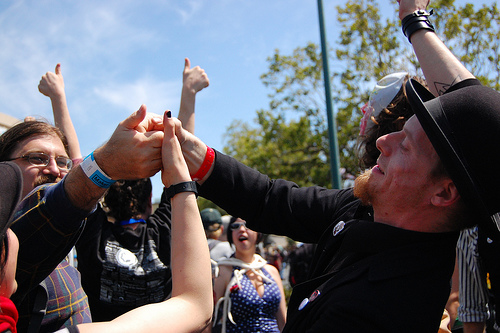 MMTW / Maker Faire 2009 / Flickr monochrom's "Climate Training Camp": More pictures  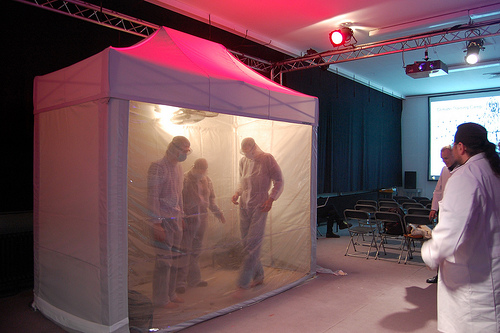 Flickr Set / Link Climate Training Camp monochrom shirt orders: US customers Ok, we are setting up our tshirt shop for US customers. Our shirt "Slacking is killing the DIY industry" is already available for shipment in the US... and you will be able to order all other designs! Endless possibility to waste your precious US dollars! Eureka! Empowerment!
On Saturday: "I can count every star in the heavens above but I have no heart I can't fall in love..." @ Machine Project, Los Angeles  @ Machine Project in Los Angeles; Saturday, June 6, 8:00 PM. Bourgeois culture was paralyzed and finally overrun by modern technologies which broke through the traditional class barriers. It went into a panic and produced these very stupid technophobic manifestos and images e.g. of "the computer". Pop music discovered and explored the computer not only as a musical instrument but also as something to sing and reflect about in a less aversive way. In doing so it influenced the conception people had of computers. The public image of computers was shaped by groups such as Kraftwerk as well as through obscure Schlager songs such as France Gall's "Computer No. 3". Not only was that image influenced by high culture computer panic but also by naïve technomania, and so it delivered the very dialectics of the computer as a means of cultural technology in capitalist society.  Link "Slacking is killing the DIY industry" on Boing Boing, Laughing Squid and Make Blog  Monochrom's Maker Faire tee says it best: "Slacking is killing the DIY industry."  Link (BB) Link (Make Blog) Link (Laughing Squid) Massive Multiplayer Thumb-Wrestling: Share your pics!  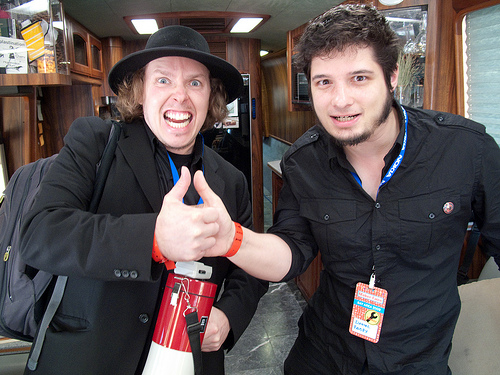 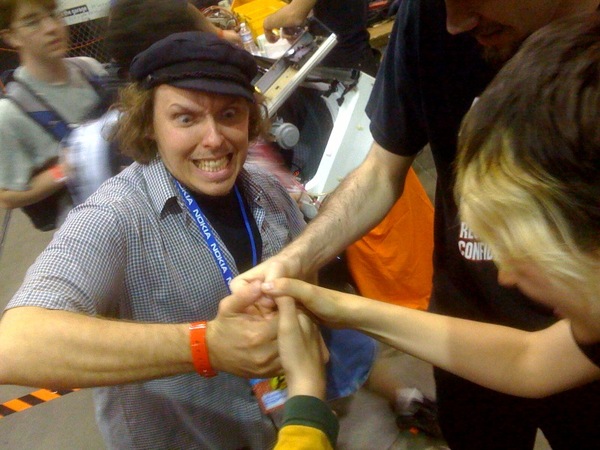 Scott Beale (Maker Faire 2009 Set) sfslim (Twitpics) [...] [The Archives] 
. . . . . |
. . monochrom is an art-technology-philosophy group having its seat in Vienna and Zeta Draconis. monochrom is an unpeculiar mixture of proto-aesthetic fringe work, pop attitude, subcultural science, context hacking and political activism. Our mission is conducted everywhere, but first and foremost in culture-archeological digs into the seats (and pockets) of ideology and entertainment. monochrom has existed in this (and almost every other) form since 1993.
[more] Booking monochrom: [Europe] [USA] External monochrom links: [monochrom Wikipedia] [monochrom Flickr] [monochrom blip.tv] [monochrom GV] [monochrom Youtube] [monochrom Facebook] [monochrom iTunes] [monochrom Twitter] 
[ P r o j e c t s ] Soviet Unterzoegersdorf / Sector 2 / The Adventure Game Krach der Roboter: Hello World! Slacking is killing the DIY industry (T-Shirt) Carefully Selected Moments / CD, LP Freedom is a whore of a word (T-Shirt) International Year of Polytheism 2007 Santa Claus Vs. Christkindl: A Mobster Battle Kiki and Bubu and The Shift / Short film Kiki and Bubu and The Privilege / Short film Kiki and Bubu and The Self / Short film Kiki and Bubu and The Good Plan / Short film Kiki and Bubu and The Feelings / Short film / Short film Soviet Unterzoegersdorf / Sector 1 / The Adventure Game I was a copyright infringement in a previous life (T-Shirt) Firing Squad Euro2008 Intervention I can count every star in the heavens above -- The image of computers in popular music All Tomorrow's Condensations / Puppet show The Redro Loitzl Story / Short film Law and Second Order (T-Shirt) They really kicked you out of the Situationist International? When I was asked to write about new economy Arse Elektronika 2007, 2008, 2009 etc. The Void's Foaming Ebb / Short film The Charcoal Burner / Short film Fieldrecording in Sankt Wechselberg / Short film Campaign For The Abolition Of Personal Pronouns Entertainment (Unterhaltung) / Short film Nicholas Negroponte Memorial Cable Experience the Experience! (West Coast USA/Canada Tour 2005) A Holiday in Soviet Unterzoegersdorf Massive Multiplayer Thumb-Wrestling Network Soviet Unterzoegersdorf Metroblogging Every Five Seconds an Inkjet Printer Dies Somewhere 452 x 157 cm² global durability Blattoptera / Art for Cockroaches An attempt to emulate an attempt The Department for Criticism against Globalisation Disney vs. Chrusov / Short film Turning Threshold Countries Into Plows Roböxotica // Festival for Cocktail-Robotics Cracked Foundation For The Fine Arts Oh my God, they use a history which repeats itself! (T-Shirt) Administrating:  . . . . . |
|||




